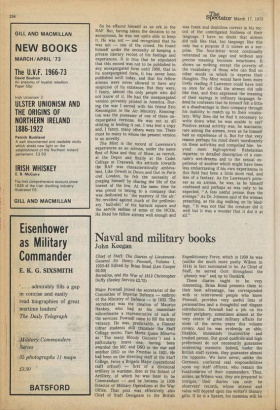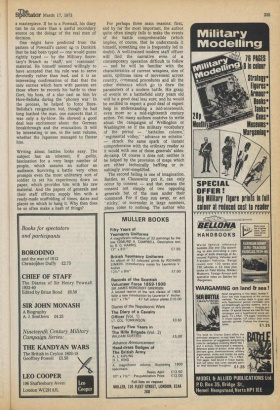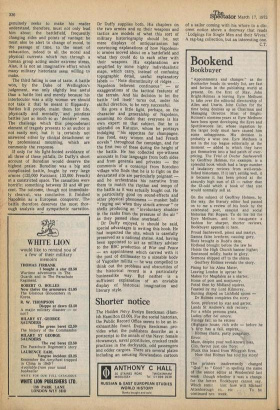Naval and military books •
John Keegan
Chief of Staff: The Diaries of LieutenantGeneral Sir Henry Pownall, Volume I, 1933-45 Edited by Brian Bond (Leo Cooper £6.50) Borodino, and the War of 1812 Christopher Duffy (Seeley Service £2.75) Major Pownall joined the secretariat of the Committee of Imperial Defence — embryo of the Ministry of Defence — in 1933. The secretariat was the creation of Maurice Hankey, who had as his immediate subordinates a representative of each of the services. Pownall came to fill the army vacancy. He was, predictably, a Gunner (other students still translate the Staff College motto, Tam Mane Quam Minerva as 'Too many Bloody Gunners ') and a particularly brave one, having been awarded the MC and DSO in the war and another DSO on the Frontier in 1931. He had been on the directing staff at the Staff College, twice a Brigade Major (operational staff officer) — first of a divisional artillery in wartime, then at the School of Artillery, of which he was later to be Commandant — and he became in 1938 Director of Military Operations at the War Office. That post was effectively also Chief of Staff Designate to the British Expeditionary Force, which in 1939 he was (unlike the much more pushy Wilson in 1914) in fact nominated to be. As Chief of Staff, he served Gort throughout the 'phoney war' and up to Dunkirk.
These diaries ought to be very interesting. Brian Bond presents them to their best advantage, has corresponded with or interviewed people who knew Pownall, provides very useful lists of personalities and a thoughtful and elegant introduction. Pownall had a job on the inner periphery, sometimes almost at the very centre of great military affairs for most of the seven years this volume covers. And he was evidently an able. likeable, immensely trustworthy and trusted person. But good qualities and high preferment do not necessarily guarantee interesting memoirs. Indeed, under the British staff system, they guarantee almost the opposite. We have never, unlike the Germans, conferred real responsibilities upon our staff officers, who remain the functionaries of their commanders. Thus, unless, as Wilson was, they are prepared to intrigue, their diaries can only be observers' records, whose interest and value will depend upon the writer's literary gifts. If he is a Spears, his memoirs will be a masterpiece. If he is a Pownall, his diary can be no more than a useful secondary source on the doings of the real men of decision.
One might have predicted from the pattern of Pownall's career up to Dunkirk that he had been typed — one would guess rightly typed — by the Military Secretary's Branch as 'staff,' not ' command' material. He himself seemed willingly to have accepted that his role was to serve devotedly rather than lead, and it is an interesting confirmation of that that the only entries which burn with passion are those where he records his battle to clear Gort, his boss, of a slur cast on him by Hore-Belisha during the 'phoney war.' In the process, he helped to force HoreBelisha's resignation but, though he had long loathed the man, one suspects that it was only a by-blow. He showed a good deal less excitement about the German breakthrough and the evacuation. It will be interesting to see, in the next volume, whether the Japanese managed to fluster him.
Writing about battles looks easy. The subject has an inherent, if guilty, fascination for a very large number of people, which assures an author an audience. Surviving a battle very often prompts even the most unliterary sort of soldier to set his experiences down on paper, which provides him with his raw material. And the papers of generals and their staff officers supply him with a ready-made scaffolding of times, dates and places on which to hang it. Why then does he so often make a hash of things? For perhaps three main reasons: first, and by far the most important, the author quite often simply fails to make the events of the battle comprehensible (which implies, of course, that he understands it himself, something one is frequently led to doubt). A well-trained modern staff officer will find the narrative even of a contemporary operation difficult to follow — and he will be familiar with the characteristics of current weapons, size of units, optimum rates of movement across country, command procedures and all the other elements which go to draw the parameters of a modern battle. His grasp of events on a battlefield sixty years old will be a good deal less sure; and he would be entitled to expect a good deal of expert help in understanding a mid-nineteenth, even more so a mid-eighteenth century action. Yet many authors contrive to write about the campaigns of Wellington or Washington as if the military vocabulary of the period — 'battalion column,' 'regimental volley,' 'advance en echelon' — struck the same spark of instant comprehension with the ordinary reader as it would with one of those generals' aidesde-camp. Of course it does not; neither is he helped by the provision of maps which are either technically baffling or insultingly over-simplified.
The second failing is one of imagination.
Battles, as Clausewitz put it, can only occur by consent — and that means the consent not simply of two opposing generals but of the men under their command. For if they run away, or act ' sticky,' or surrender in large numbers, plans come to nothing. The author who genuinely seeks to make his reader understand, therefore, must not only lead him about the battlefield, frequently changing sides and points of vantage; he must also be alert to change of mood, to the passage of time, to the onset of exhaustion, indeed to all the moral and physical currents which run through a human group acting under extreme stress. Alas, it is not an imaginative effort which many military historians seem willing to make.
The third failing is one of taste. A battle won, by the Duke of Wellington's judgement, was only slightly less awful than a battle lost and merely because his interlocutor was a silly woman we should not take it that he meant it flippantly. Battles kill people, maim them for life, physically and mentally, and pointless battles just as much so as ' decisive ' ones. The challenge which this preponderant element of tragedy presents to an author is not easily met; but it is . certainly not answered either by clinical detachment or by professional mourning, which are commonly the response.
if only for his light-footed avoidance of all three of these pitfalls, Dr Duffy's short account of Borodino would deserve the highest praise. Borodino was a big and complicated battle, fought by very large armies (125,000 Russians; 133,000 French) in a constricted space. The casualties were horrific: something between 33 and 40 per cent. The outcome, though not immediately clearcut, was conclusive: it finished Napoleon as a European conqueror. The battle therefore deserves the most thorough analysis and sympathetic narration. Dr Duffy supplies both. His chapters on the two armies and on their weapons and tactics are models of what this sort of military historiography should be, not mere displays of antiquarianism but convincing explanations of how Napoleonic armies moved about on a battlefield and what they could do to each other with their weapons. His explanations are amplified by some highly individualistic maps, which carry, instead of confusing topographic detail, useful explanatory labels — 'Note discontinuity of ridges ... Napoleon believed continuous' — or exaggerations of the tactical features of the terrain. And his decision to let the battle ' tell itself ' turns out, under his skilful direction, to be very successful.
He goes a little light, perhaps, on the character and generalship of Napoleon, assuming no doubt that everyone is his own expert on that subject. But he is splendid on Kutuzov. whom he portrays indulging "his appetites for champagne, fine food, easy women and bad French novels" throughout ene campaign, and for the first two of these during the height of the battle. He has collected eye-witness accounts in four languages from both sides and from generals and privates — the comments of a conscript from Borodino village who finds that he is to fight on the devastated site are particularly poignant — and he orchestrates his narrative from them to match the rhythm and tempo of the battle as it was actually fought out. He is particularly good on sound-effects and other physical phenomena — musket balk "ringing out when they struck armour" or shells producing an "involuntary shudder in the ranks from the pressure of the air as they passed close overhead.
Dr Duffy enjoyed, it should be said, special advantages in writing this book. He had inspected the site, which is carefully preserved as a national shrine. And, having been appointed to act as military adviser to the BBC production of War and Peace — an appointment which carried with it the post of drillmaster to a sizeable body of Yugoslav militia — he was compelled to think out the problems and obscurities of the historical record in a particularly businesslike way. But neither is a sufficient explanation of an enviable display of historical imagination and literary style.




































 Previous page
Previous page